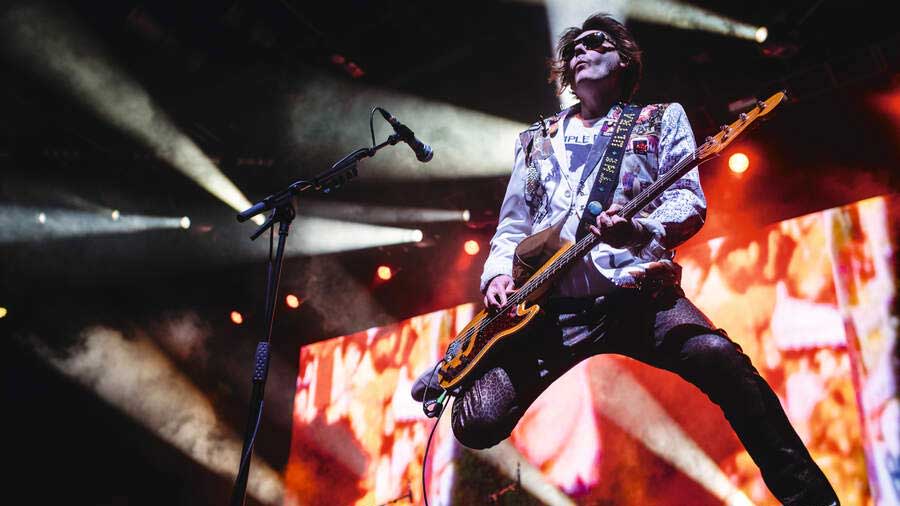Manic Street Preacher Nicky Wire once wanted to lacerate the world - now he's doing it to himself

Formed in 1986 by four schoolmates from Blackwood in South Wales, the Manic Street Preachers were devastated when almost a decade later guitarist and lyricist Richey Edwards vanished mysteriously (he was later presumed dead). Continuing as a trio with their fourth album, 1996’s Everything Must Go, they flourished by adopting a more mature sound. Blow, bassist Nicky Wire previews their upcoming tour.

It’s hilarious to think that the master plan of the Manics amounted to releasing a debut album that would outsell Appetite For Destruction, then split instantly.
There’s still a chance that could happen [laughs]. Ah, the power, optimism and delusion of youth.
What would Richey Edwards make of the fact that the Manics are still here all these decades down the line, making chart-topping albums and headlining arenas?
That’s a strange one to consider. He’d probably like the records that we do, and I suspect we’d still be having conversations about lyrics. In Richey’s era the biggest gig we did was Brixton Academy. He’d probably enjoy the idea of us walking out on stage at the Millennium Stadium [in Cardiff] in front of sixty thousand people – at least once, anyway.
The past five years have provided a lot of priceless subject matter for a socially aware band. As two of the most important elections of our age approach, will the next album be a bit of a hand grenade?
To be honest, I’m just racked with self-loathing and criticism. I’m less into lacerating the world that surrounds us and more doing that to myself.
Could you explain that statement?
As you get older the writing becomes nuanced and the brain and the body slow down. I don’t want to be that bloke in the corner of the pub, raging and pretending to know the answers to things.
Given the divisive that way our politicians behave, isn’t it hard to bite your tongue?
I don’t know. I just do things in a more controlled way. I’m a pretty divisive person myself. Look, I would love to still be that gobshite singing Nat West Barclays Lloyds, but that was back in 1990.
The band’s last album, 2021’s The Ultra Vivid Lament, featured one of the last vocal performances from Mark Lanegan. Fashionably late, I just read Lanegan’s book Sing Backwards And Weep. Talk about unflinchingly honest.
Isn’t it just? We go back a long way with Mark. We supported Oasis and The Screaming Trees in America in 1997. Richey was a huge Screaming Trees fan, but Mark wasn’t in the best of states on that tour. He did a fantastic job for us on that song, and, sadly, not too long afterwards he was gone.
As a huge Rush fan, presumably you bought Geddy Lee’s book on the day it came out?
I interviewed Geddy in Wolverhampton on his book tour, so I have a signed copy. That was a thrill of a lifetime. Some of its revelations – the drug side of Rush – made me think: “What the fuck?” I’m not a huge reader of biographies, but Geddy’s was such a harrowing read at times, with what his parents went through [in Auschwitz], and saying goodbye to Neil Peart for the last time. I just couldn’t put that one down.
Should Geddy and Alex get a new drummer?
I don’t think it’ll happen. Would I like to see it? I don’t know. Neil was such a brilliant lyricist, it wouldn’t be the same. I struggle to get on stage at fifty-five, so what must it be like for those guys?
Do you have a memoir inside, bursting to get out?
There’s a book, but it’s all about timing. That’s probably why Geddy was so honest in his own, Rush are pretty much finished. I’ve written quite a bit for mine, but I don’t know if I fancy putting it out while we are still a living organism as a band.
The Manics have been working on their fifteenth album. How is it coming along?
The recording is ninety per cent done, but we haven’t mixed it yet. It will be out in January or February of next year.
What will it sound like?
It has a lot of energy, even though I don’t feel particularly energised. One of the songs is like a mixture of The Cardigans and The Skids, who are two of our favourite bands, and another sounds like Come Up And See Me [by Cockney Rebel] played by Dinosaur Jr.
There’s also a twentieth-anniversary reboot of the Manics’ Lifeblood coming, which includes a Steven Wilson remix of its lead track 1985.
Steven is the king of spatial audio. We had mixed a track for him and he returned the favour by doing one for us. He’s great at what he does, he’s amazingly selfless.
Back then the band feared that the experimental Lifeblood might turn out to be their last album.
It’s true. Much as we loved making that record, instinct told me Lifeblood would be our worst-performing album. That stuff mattered a lot back then, not so much these days.
The Manics’ upcoming tour is a co-headliner with indie-rockers Suede. Why is that pairing an attractive package?
Both bands come from a similar place, comfortably on the outside and never really part of anything. There’s a shared survival instinct that comes from the ups and downs of being in a band. We’ve done eighty thousand tickets in the UK, which suggests to me there's a lot of people that want to see it.
The Manic Street Preachers' UK tour with Suede kicks off in Llangollen, Wales, on June 28. Check the Manics' website for dates and tickets.
